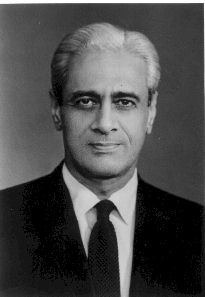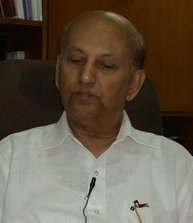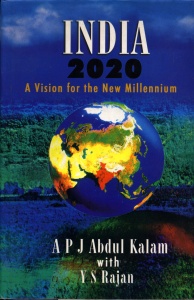
Avul Pakir Jainulabdeen Abdul KalamBR was an Indian aerospace scientist and statesman who served as the 11th president of India from 2002 to 2007. He was born and raised in Rameswaram, Tamil Nadu and studied physics and aerospace engineering. He spent the next four decades as a scientist and science administrator, mainly at the Defence Research and Development Organisation (DRDO) and Indian Space Research Organisation (ISRO) and was intimately involved in India's civilian space programme and military missile development efforts. He thus came to be known as the Missile Man of India for his work on the development of ballistic missile and launch vehicle technology. He also played a pivotal organisational, technical, and political role in India's Pokhran-II nuclear tests in 1998, the first since the original nuclear test by India in 1974.

Satish Dhawan was an Indian mathematician and aerospace engineer, widely regarded as the father of experimental fluid dynamics research in India. Born in Srinagar, Dhawan was educated in India and further on in United States. Dhawan was one of the most eminent researchers in the field of turbulence and boundary layers, leading the successful and indigenous development of the Indian space programme. He succeeded M. G. K. Menon, as the third chairman of the Indian Space Research Organisation (ISRO) in 1972. The second launch pad of ISRO, Satish Dhawan space centre is named after him. He is greatly regarded as the man behind A. P. J. Abdul Kalam.

Udupi Ramachandra Rao was an Indian space scientist and former chairman of the Indian Space Research Organisation. He was also the Chairman of the Governing Council of the Physical Research Laboratory at Ahmedabad and Nehru Planetarium at Bengaluru and chancellor of the Indian Institute for Space Science and Technology (IIST) at Thiruvananthapuram. He is known as "The Satellite Man of India". He pioneered India's first satellite launch Aryabhata in 1975.

India 2020: A Vision for the New Millennium is a book, written by the 11th President of India A P J Abdul Kalam and Y. S. Rajan. The book was written by the duo in the year 1998, before Kalam's tenure as President. It talks about Kalam's prediction for India's future and for developing India.

Vijay Pandurang Bhatkar is an Indian computer scientist, IT leader and educationalist. He is best known as the architect of India's national initiative in supercomputing where he led the development of Param supercomputers. He is a Padma Shri, Padma Bhushan, and Maharashtra Bhushan awardee. Indian computer magazine Dataquest placed him among the pioneers of India's IT industry. He was the founder and executive director of Centre for Development of Advanced Computing (C-DAC) and is currently working on developing exascale supercomputing for India.

G. Madhavan Nair is an Indian space scientist and a former Chairman of the Indian Space Research Organisation, and Secretary to the Department of Space, Government of India. He has also been the Chairman of the Space Commission and Chairman of the Governing Body of the Antrix Corporation, Bangalore.
A Sivathanu Pillai is an Indian scientist who formerly served as Honorary Distinguished Professor at Indian Space Research Organisation (2015–2018) and an honorary professor at IIT Delhi in the Department of Mechanical Engineering (2015–2016) and a visiting professor at Indian Institute of Science (2014–2015).
Brahm Prakash, was a metallurgist known for his work with nuclear materials in India.

Professor Bhagavatula Dattaguru is an Indian engineer and academic. He has received several awards, including the Padma Shri Award, India's fourth highest civilian honour in 2005 in the field of science and engineering.

Bulusu Lakshmana Deekshatulu is an Indian academic who has made important contributions to Digital Image Processing and Control Theory. He is a Fellow of The World Academy of Sciences, Fellow of Indian National Science Academy, The National Academy of Sciences, India, Indian Academy of Sciences, Indian National Academy of Engineering, National Academy of Agricultural Sciences, and IEEE.
Krishna Lal Chadha is an Indian horticultural scientist, author and a former National Professor of the Indian Council of Agricultural Research. He was honored by the Government of India, in 2012, with the fourth highest Indian civilian award of Padma Shri.
Bhupathiraju Somaraju, shortly B. Somaraju, is an Indian cardiologist and was the chairman of CARE Hospitals, Hyderabad. Author of many medical articles in peer reviewed journals and an elected fellow of the National Academy of Medical Sciences, he was honoured by the Government of India, in 2001, with the fourth highest Indian civilian award of Padma Shri.
Suhas Pandurang Sukhatme is an Indian scientist, teacher, author and a former Chairman of the Atomic Energy Regulatory Board of the Government of India, known for his expertise in heat transfer and energy technologies. He was honoured by the Government of India, in 2001, with the fourth highest Indian civilian award of Padma Shri.

Narayanaswamy Balakrishnan is an Indian aerospace and computer scientist. He is a Professor of the Department of Aerospace Engineering and Supercomputer Education Research Centre of Indian Institute of Science and a visiting professor of Jawaharlal Nehru Centre for Advanced Scientific Research. Balakrishnan was honored by the Government of India, in 2002, with the fourth highest Indian civilian award of Padma Shri
Prafulla Kumar Jena was an Indian metallurgist who served as director of the National Institute for Interdisciplinary Science and Technology of the Council for Scientific and Industrial Research, Bhubaneshwar. He previously held the TATA Chair for the Distinguished Professor of Metallurgical Engineering at the Indian Institute of Technology, Kharagpur. He was awarded the Padma Shri, India's fourth highest civilian award, in 1977.
Nilamber Pant is an Indian space scientist, a former member of the Space Commission of India and a pioneer of satellite based communication and broadcasting in India. He served at the Satish Dhawan Space Centre and the ISRO Satellite Centre before becoming the vice chairman of the Indian Space Research Organization (ISRO). The Government of India awarded him the fourth highest Indian civilian honour of Padma Shri in 1984.
Lila Firoz Poonawalla is an Indian industrialist, philanthropist, humanitarian and the founder of Lila Poonawalla Foundation, a non governmental organization.

Dipankar Chatterji is an Indian molecular biologist and the Honorary Professor at Molecular Biophysics Unit, Indian Institute of Science, a multidisciplinary research institute under the Department of Science and Technology of the Government of India. He is known for his pioneering research on bacterial transcription. He is a recipient of Shanti Swarup Bhatnagar Prize and is an elected fellow of all the major Indian science academies. The Government of India awarded him the fourth highest civilian honour of the Padma Shri, in 2016, for his contributions to science and engineering.

Kasturi Lal Chopra was an Indian materials physicist and a former director of the Indian Institute of Technology, Kharagpur. He was the founder of the Thin Film Laboratory at Indian Institute of Technology, Delhi and the Microscience Laboratory at IIT, Kharagpur and held several US and Indian patents for his research findings. Author of a number of books on thin film technology, he was a recipient of Shanti Swarup Bhatnagar Prize, the highest Indian award in the science and technology categories. The Government of India awarded him the fourth highest civilian honour of the Padma Shri, in 2008, for his contributions to science and engineering.
Defence Research & Development Service (DRDS) is a Central Group 'A' Civil Service of the Government of India. DRDS scientists are Gazetted defence-civilian officers under the Ministry of Defence. They are responsible for developing new technologies and military hardware for the Indian defence and security forces.










